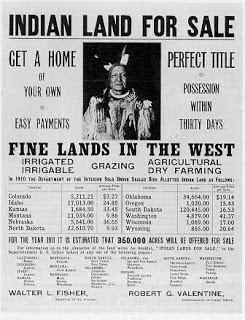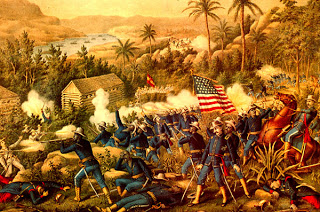Thursday, January 3, 2013
LAD Blog #25 Dawes Severalty Act of 1877
The Dawes Act, approved by Congress in February of 1887, provided for the relocation of Indians to specified reservations. It was one of the early attempts to help "Americanize" native Americans so that they would have a better chance of assimilating into society eventually and this government action aimed to do just so.This document stated that all Indians would be assigned a section of land to live on; this land could also be surveyed at any time. The act also designated how much land each person would be appropriated. Naturally, the head of the family received the most land. However, if they were not given land in a reservation, Indians were permitted to live elsewhere in the United States. The Dawes Act specified that this act was only binding for 25 years. At that point, the president could make the decision whether or not to extend its life. The act provides that all Indians will have the benefit of being under American law and will have equal rights as Americans. The government retained its power to use the land for any public use it deemed necessary or helpful.
Wednesday, January 2, 2013
LAD Blog #24 William Jennings Bryan's Cross of Gold Speech
William Jennings Bryan on July 9, 1896, at the Democratic National Convention in Chicago. The issue was whether to endorse the free coinage of silver at a ratio of silver to gold of 16 to 1. This would have increased the amount of money in circulation and aided poor farmers. Byran ran for President in 1896, 1900 and 1908. Bryan believes, and shows this belief in his speech, that the “money question” is the dominant issue in America and in the election. He supports the working men. He also praises people like Andrew Jackson for wanting to remove power from the wealthy and return that power to the common man. Byran strongly supports the income tax and the coinage of silver. He stated that he does not want the wealthy to “crucify mankind on a cross of gold”. His party was also known as the silver democrats and in his speech you could tell he felt strongly about his views.
LAD:Blog #23: The Populist Party Platform
The Populist Movement began in the 1870's and 1890's. The Populist Party appeeared as a third party as a repsonse to the growth of industrialism, opposing the "concentrated capital" The Populist believed that there was alot of corruption in concerns to voting. Arguing that people do not truly have a voice and the working men are denied basic rights. The believe that silver should be accpeted as money and that the supply of currency is purposely limited. Claiming that there is a conspiracy against mankind. They stated that "
We seek to restore the government of the Republic to the hands of the "plain people." " Populist want the government to expand and to end oppression. Their platform included various ideas concerning a maintence of labor forces, finance, and transportation. With finance they hoped for free and unlimited coinage of silver and gold. They wanted the government to own and operate the railroads. Also, they stated that the land should not be monopolized. They included an expression of sentinments that demanded a free ballot, revenue derived frome income tax and opposed national aid to any private corporations.
Sunday, December 30, 2012
LAD Blog #22 McKinley's War Message
McKinley opened his war message with "In the name of humanity...The war in Cuba must stop." Given after Cuba revolted in 1895 against their Spanish rulers. He gave his speech in April 11 1898. McKinley stated that his main reason for going to war is because of the "crisis that has arisen in the relations of the United States to Spain by reason of the warfare that for more than three years has raged in the neighboring island of Cuba. . . ." Believing that the war between Cuba and Spain should be ended as a soon as possible. McKinley seems to be using the raging civil war almost as an excuse to attack the Spanish and place the island of Cuba under control of the United States. McKinley argues that the United States has had problems keeping their promise of neutrality with the crisis in Cuba, and that Spain has offended the United States with its "exercise of cruel, barbarous, and uncivilized practice of warfare". McKinley wanted an armistice to the war between Cuba and Spain so America could regain its lost economic assets in the country and try to revive the ailing economy. McKinley also wants to put an end to the atrocities that were taking place in Cuba under the Spanish government. He also states that the sinking of the USS Maine was a clear indicator of the conditions in Cuba and that direct intervention is necessary to protect American interests. Finally, he mentions how Spain notified America two days ago that they were suspending hostilities in Cuba, and includes that he hopes Congress will take this fact into account. He closes the speech by saying " this measure attains a successful result, then our aspirations as a Christian, peace-loving people will be realized." Showing America's growing role as big brother in the Western Hemisphere. However, the final decision is left up to congress.
Subscribe to:
Comments (Atom)

